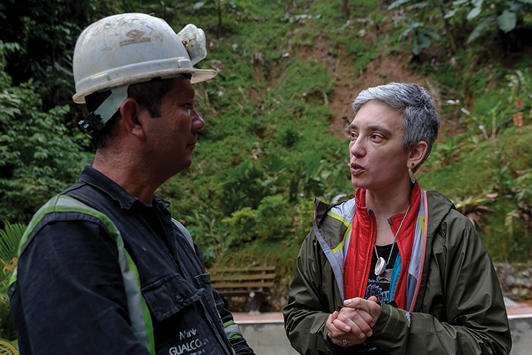
Christina Miller has dedicated her working life to changing the way people think. After training as a jeweler — including a master’s program and a year at a hands-on school in Italy — she spent four years shaping young minds as a jewelry and metalsmithing professor at Millersville University, Pennsylvania. In 2004, she cofounded Ethical Metalsmiths, a community-driven organization devoted to educating the industry on sustainable practices.
In 2015, Miller made the decision to leave her role as executive director of Ethical Metalsmiths to focus on a new venture: a consultancy business that runs under her own name and helps companies of all sizes shore up their responsible business practices. Since its launch, the Christina T. Miller consultancy has worked with major international players, including the Kimberley Process Civil Society Coalition, Impact, and the Amazon Aid Foundation. It’s currently working on USAID’s Zahabu Safi (Clean Gold) Project to create sustainable supply chains for artisanal gold mines in the Democratic Republic of Congo.
Day to day, however, she focuses on small, independent jewelry brands, which make up about 75% of her client list. “We try to offer progressive visioning for how a jewelry brand could be purpose-driven to solve something beyond delivering on demand for jewelry,” she says.
This process will often start with an audit of a jeweler’s website. What Miller and her team look for during this time is unfounded claims: “Are we greenwashing? Are we saying something we can’t validate?” To gain and retain consumer trust, she says, brands need to present a realistic picture of where they are now, not where they want to be.
Supply demands
The next step is a little more difficult: the supply chain. Often, her clients have long-standing relationships with their suppliers and feel awkward about pushing them on ethical claims, or simply might not know what to ask. Such relationships are delicate and are often business-critical, so it can help to have an external consultant be the face of these investigations.
“People are fine asking initial questions of their suppliers, [like] ‘Hey, how are you? I would love to know more about where your diamonds come from. I would love to know more about where you’re getting your gold,’” says Miller. “But then we hit a point where the evidence doesn’t exist, and so you have to be willing to really press your supplier for answers. And people become insecure; they don’t have the confidence to ask those questions. Or they don’t know how to evaluate the answers. So that’s also where we come in as support.”
The consultancy conducts interviews with suppliers to assess where they are with ethics, and tailors this to the needs of its clients rather than following a cookie-cutter checklist. For example, she says, “if the company’s mission is really driven by equal rights for women around the world, then we really drill down [on that], and when we’re asking questions of the suppliers, we’re really trying to get answers about [gender equality]. We’re trying to sort through what’s true and what’s not. It makes both parties nervous, so it helps to have an outside interviewer.”
Practical lessons
Once Miller’s team has fully audited the supply chain, verified claims, and matched them up with the client’s marketing materials and website, the next step is helping the business set goals and pathways. Miller also steps in to assist when companies are ready to make such targets or new claims public, ensuring they do so in the right way.
Of course, she recognizes that not all businesses will have the budget to employ a consultancy like hers for one-on-one coaching, but she is keen to lift up the industry as a whole, which is why she is looking at alternative methods of delivering educational content. Her company offers free 20-minute consultations to help brands identify where they want to go next on their sustainability journey. Since 2020, it has also hosted the Living Room Sessions, a series of donation-funded online events in which invited speakers talk about subjects within the ethics space. All of these videos are available for free on the consultancy’s website, with recent topics including Peruvian Fairmined gold, the basics of responsible jewelry practice, and the Ukraine war’s impact on Russian diamonds. In September, the company entered the education space more formally with the launch of its first online course, “Foundations for Sustainable Jewelry Practices,” which costs less than $100.
All of these efforts are geared toward giving jewelers practical advice that will instill in them the confidence to tackle what can sometimes be a daunting challenge.
“You have to turn a complex situation into a small step forward,” Miller advises. “Just look at your own mission, your own reason to exist as a company. Is it sustainable? What can you do with it? Does it match your values? I know it’s challenging with the bottom line [to consider], but it takes heart to actually create a positive impact in the world. Also — and this is advice for life — it’s probably fair to expect that people do better, and you’re allowed in a transactional relationship to ask for the information you need. Don’t be shy.”
Image: FairminedArticle from the Rapaport Magazine - November 2022. To subscribe click here.